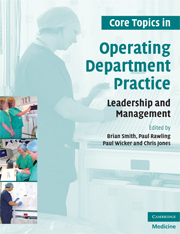Book contents
- Frontmatter
- Contents
- List of contributors
- Foreword
- Preface
- 1 Managing change in perioperative education
- 2 The role of the operating department manager within the context of the organization
- 3 Action learning: a new way of problem solving in perioperative settings
- 4 Agenda for change: what do theatre staff need to know?
- 5 The SWOT analysis: its place in strategic planning in a modern operating department
- 6 Corporate governance: setting the scene for perioperative practice
- 7 Managing different cultures: adversity and diversity in the perioperative environment
- 8 Leadership in perioperative settings: a practical guide
- 9 Management and leadership of advanced practice
- 10 Managing conflict in perioperative settings
- 11 The management and organization of emergency operating lists
- 12 Organizational culture
- 13 Development matters in the NHS; including a perioperative approach to the KSF
- 14 Equipment procurement: a purchaser's guide for theatre managers
- 15 The reflective practitioner in perioperative settings
- 16 New ways of working in perioperative practice
- 17 Damned if you do and damned if you don't: whistle blowing in perioperative practice
- 18 A manager's experience of recruitment and retention
- 19 The management of change
- Index
- References
3 - Action learning: a new way of problem solving in perioperative settings
- Frontmatter
- Contents
- List of contributors
- Foreword
- Preface
- 1 Managing change in perioperative education
- 2 The role of the operating department manager within the context of the organization
- 3 Action learning: a new way of problem solving in perioperative settings
- 4 Agenda for change: what do theatre staff need to know?
- 5 The SWOT analysis: its place in strategic planning in a modern operating department
- 6 Corporate governance: setting the scene for perioperative practice
- 7 Managing different cultures: adversity and diversity in the perioperative environment
- 8 Leadership in perioperative settings: a practical guide
- 9 Management and leadership of advanced practice
- 10 Managing conflict in perioperative settings
- 11 The management and organization of emergency operating lists
- 12 Organizational culture
- 13 Development matters in the NHS; including a perioperative approach to the KSF
- 14 Equipment procurement: a purchaser's guide for theatre managers
- 15 The reflective practitioner in perioperative settings
- 16 New ways of working in perioperative practice
- 17 Damned if you do and damned if you don't: whistle blowing in perioperative practice
- 18 A manager's experience of recruitment and retention
- 19 The management of change
- Index
- References
Summary
Key Learning Points
Provide an understanding of the concept of action learning
Explore the role of an action learning set and its potential as a continuing professional development experience within perioperative settings
Examine the potential for action learning as a problem-solving process in the context of a dynamic NHS
Introduction
In 2000 the NHS Plan was launched (Department of Health 2000a). Current frameworks for the design and delivery of responsive services are built on the principle of ensuring that clear national standards are developed that are supported by evidence-based guidance. This is in order that the quality of care provided by healthcare professionals is raised (Department of Health 2000b).
In addition, the government is committed to putting quality at the forefront of the NHS: healthcare professionals have a key part to play in this. Quality assurance or health governance requires an inclusive approach embracing all those working within it inclusive of patients and carers. The aim is that clinical practice is evidence based and that best practice is disseminated throughout the service.
Within the NHS Plan there was a commitment to ensuring that the NHS should be a model employer (Department of Health 2000a). The provision of lifelong learning opportunities was seen as fundamental to this. A framework for lifelong learning was developed (Department of Health 2001), which outlined a programme for modernizing learning and development. This was underpinned by the ‘Skills Escalator’, which is a strategy for recruiting a more diverse range of people to the NHS and for enabling new and existing staff to develop their skills continuously and take on new roles.
- Type
- Chapter
- Information
- Core Topics in Operating Department PracticeLeadership and Management, pp. 19 - 27Publisher: Cambridge University PressPrint publication year: 2009
References
- 1
- Cited by

